Payload preparations are advancing for Arianespace’s upcoming launch: a Soyuz mission to orbit the SES-15 telecommunications spacecraft from the Spaceport in French Guiana next week.
The satellite has been installed on its payload adapter, which will serve as the integration interface with the Soyuz launch vehicle. This mating activity occurred in the Spaceport’s S1B clean room facility.
SES-15 will be the 40th satellite launched by Arianespace for the European-based SES satellite operator, and it marks this long-time customer’s first use of the Soyuz from French Guiana.
The satellite has an estimated liftoff mass of 2,302 kg., with the workhorse Soyuz launcher’s total lift performance set at 2,447 kg. – taking into account the payload integration equipment and other hardware.
Next week’s mission is set for a May 18 liftoff in the morning hours from the Spaceport’s Soyuz Launch Complex (ELS) in Sinnamary, French Guiana, delivering SES-15 into a sub-geostationary transfer orbit. The mission is designated Flight VS17 in Arianespace’s launcher family numbering system, signifying the 17th Soyuz liftoff from the Spaceport.
Quelle: Broadband TV News
+++
SES-15 is readied for its May 18 liftoff on Arianespace’s workhorse Soyuz launcher
Payload preparations are advancing for Arianespace’s upcoming launch: a Soyuz mission to orbit the SES-15 telecommunications spacecraft from the Spaceport in French Guiana next week.
The satellite has been installed on its payload adapter, which will serve as the integration interface with the Soyuz launch vehicle. This mating activity occurred in the Spaceport’s S1B clean room facility.
SES-15 will be the 40th satellite launched by Arianespace for the European-based SES satellite operator, and it marks this long-time customer’s first use of the Soyuz from French Guiana.
The satellite has an estimated liftoff mass of 2,302 kg., with the workhorse Soyuz launcher’s total lift performance set at 2,447 kg. – taking into account the payload integration equipment and other hardware.
Next week’s mission is set for a May 18 liftoff in the morning hours from the Spaceport’s Soyuz Launch Complex (ELS) in Sinnamary, French Guiana, delivering SES-15 into a sub-geostationary transfer orbit. The mission is designated Flight VS17 in Arianespace’s launcher family numbering system, signifying the 17th Soyuz liftoff from the Spaceport.
Launch window for Flight VS17
Liftoff is scheduled for Thursday, May 18, 2017 at exactly:
| French Guiana | Universal Time (UTC) | Washington, D.C. | Luxembourg |
| 08:54:53 a.m. | 11:54:53 a.m. | 07:54:53 a.m. | 01:54:53 p.m. |
Quelle: arianespace
---
Update: 18.05.2017
.
Arianespace’s Soyuz is approved for liftoff with SES-15
Authorization has been given for tomorrow’s Arianespace Soyuz launch from French Guiana, providing the “all clear” for this medium-lift mission that will orbit a telecommunications satellite for European-based operator SES.

Preparations for Flight VS17 included the placement of decals for satellite operator SES on the Soyuz launcher’s protective payload fairing.
The approval was granted today after the regular pre-launch review for Arianespace flights – which confirmed the readiness of Soyuz and its SES-15 satellite passenger, the launch site and associated infrastructure at the Spaceport, as well as the network of downrange tracking stations.
The May 18 mission – designated VS17 in Arianespace’s numbering system – will be performed from the purpose-built ELS launch facility for Soyuz. Liftoff is scheduled at precisely 8:54:53 a.m. local time in French Guiana, with SES-15 to be deployed during a flight lasting approximately 5 hrs., 18 min.
Built by Boeing, SES-15 will be the 40th spacecraft orbited by Arianespace for long-time customer SES. It has an estimated liftoff mass of 2,302 kg., while the mission’s total lift performance to geostationary transfer orbit is set at 2,447 kg. – taking into account the payload integration equipment and other hardware.
SES-15 is to be operated by SES from an orbital position of 129 deg. West, with the satellite offering extensive coverage over North America, Mexico and Central America – stretching from Arctic Alaska to the South of Panama, and from Hawaii to the Caribbean.
Flight VS17 will be Arianespace’s fifth mission performed so far in 2017 (following two using the heavy-lift Ariane 5, and one each with the medium-lift Soyuz and lightweight Vega), as well as the 17th Soyuz liftoff performed from French Guiana since this vehicle’s 2011 introduction at the Spaceport.
Larger versions of the photos above are available to download in the Gallery.
Launch window for Flight VS17
Liftoff is scheduled for Thursday, May 18, 2017 at exactly:
| French Guiana | Universal Time (UTC) | Washington, D.C. | Luxembourg |
| 08:54:53 a.m. | 11:54:53 a.m. | 07:54:53 a.m. | 01:54:53 p.m. |
Quelle: arianespace
+++
The 40th SES satellite orbited by Arianespace is lofted on its latest Soyuz mission success

With a picture-perfect liftoff from the Spaceport in French Guiana this morning, Arianespace’s workhorse Soyuz launch vehicle successfully delivered SES-15 – an all-electric telecommunications satellite for operation by European-based SES – to a sub-geostationary transfer orbit.
 The flight, designated VS17 in Arianespace’s launcher family numbering system, lasted 5 hrs., 18 min. from the precise liftoff at 08:54:53 a.m. (local time in French Guiana) to payload separation. It carried SES’ first satellite lofted by the medium-lift Soyuz launcher and the 40thoverall for the operator launched by Arianespace.
The flight, designated VS17 in Arianespace’s launcher family numbering system, lasted 5 hrs., 18 min. from the precise liftoff at 08:54:53 a.m. (local time in French Guiana) to payload separation. It carried SES’ first satellite lofted by the medium-lift Soyuz launcher and the 40thoverall for the operator launched by Arianespace.
Departing from the Spaceport’s ELS launch complex adjacent to the commune of Sinnamary, Flight VS17 delivered a total payload lift performance set at 2,447 kg; it was Arianespace’s fifth mission of 2017 and the Russian-built Soyuz’ 17th liftoff from French Guiana since this vehicle’s 2011 introduction at the Spaceport.
Arianespace’s long-term relationship with SES
Luce Fabreguettes, Arianespace’s Executive Vice President Missions, Operations & Purchasing, underscored Arianespace’s relationship with SES stretching back to 1984. She noted that more than 40 percent of the SES geostationary satellites currently in operation have been orbited by the launch services company – a number that does not include the O3b Networks satellites launched by Arianespace into medium Earth orbit.
Fabreguettes pointed out that Arianespace has five more SES satellites in the company’s launch services backlog – including another electric satellite, SES-12 –– along with four additional O3b spacecraft.
Delivered into a sub-geostationary transfer orbit by Soyuz, the telecom satellite will achieve the final position under the power of its all-electrical propulsion system –SES’s first satellite to use such technology.
The first hybrid satellite for SES
Once located at 129 deg. West, SES-15 will serve as SES’ first hybrid satellite, offering extensive coverage over North America, Mexico and Central America, stretching from Arctic Alaska to the South of Panama and from Hawaii to the Caribbean.
It is to provide Ku‐band wide beam and Ku‐band High Throughput Satellite (HTS) capability, with connectivity to gateways in Ka‐ and L-bands. Its relay payload covers the thriving aeronautical sector and will enable other traffic‐intensive data applications such as government, VSAT networks and maritime.
SES-15 also carries a Wide Area Augmentation System‐hosted (WAAS) payload, enabling the U.S. Federal Aviation Administration to augment the Global Positioning System (GPS), providing improving accuracy, integrity and availability for the aviation industry.
Built by Boeing at its El Segundo, California facility, SES‐15 is based on the company’s all‐electric 702SP platform and is the 53rd Boeing‐built satellite to be launched by Arianespace.
Preparing for the upcoming Ariane 5 flights
Elsewhere at the Spaceport, preparations are being made for Arianespace’s next two heavy-lift missions: Flights VA237 and VA238, the 237th and 238th flight of an Ariane launcher since the family of European-built vehicles began Spaceport operations in 1979.
Flight VA237’s Ariane 5 launcher has moved from the Launcher Integration Building to the Final Assembly Building, where a dual payload of the Viasat-2 and Eutelsat E172B telecommunications satellites will be integrated. Liftoff of VA237 is set for June 1.
The subsequent Ariane 5 launch, Flight VA238, also will deliver two satellites: the Hellas-Sat 3/Inmarsat S relay satellite; and the GSAT-17 telecommunications spacecraft for the Indian Space Research Organisation.
-
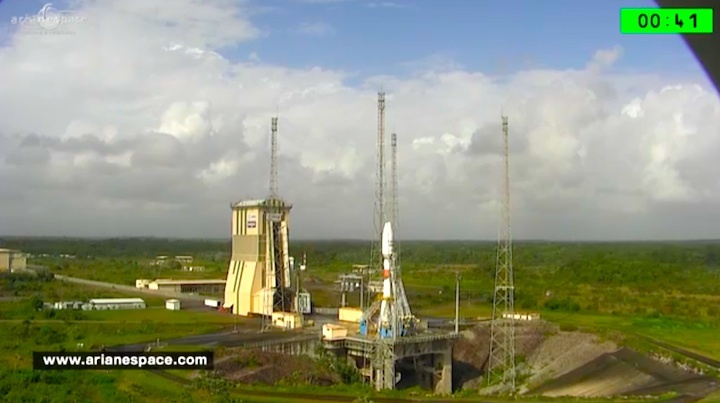
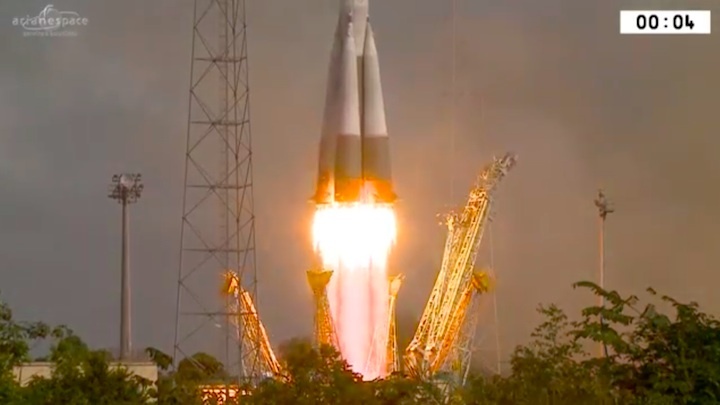
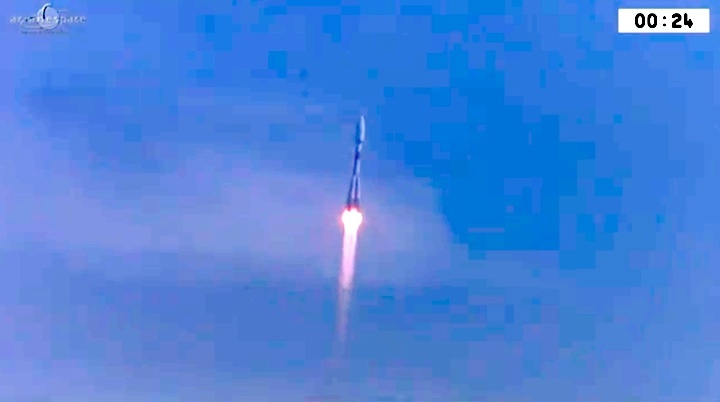
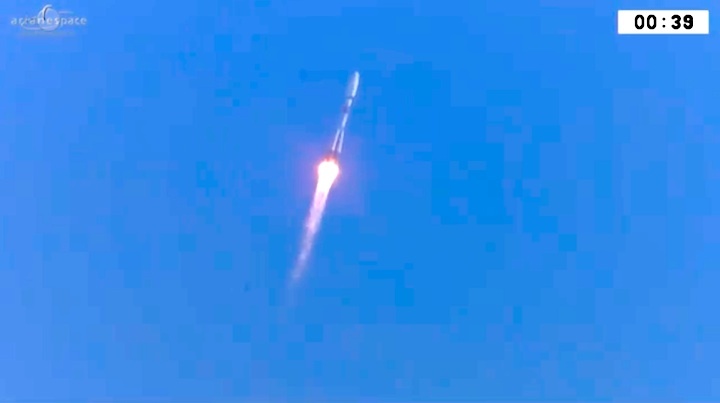
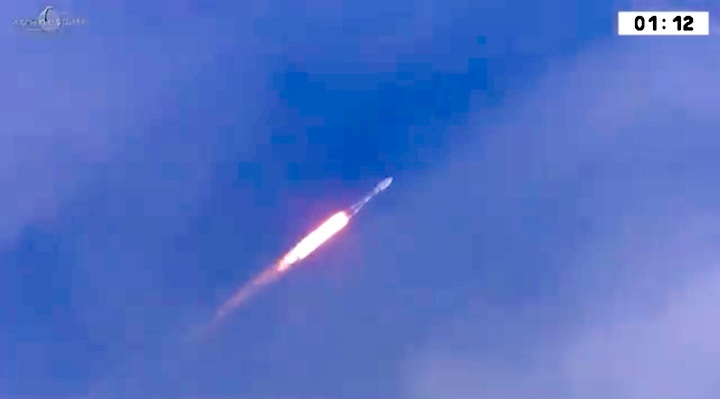
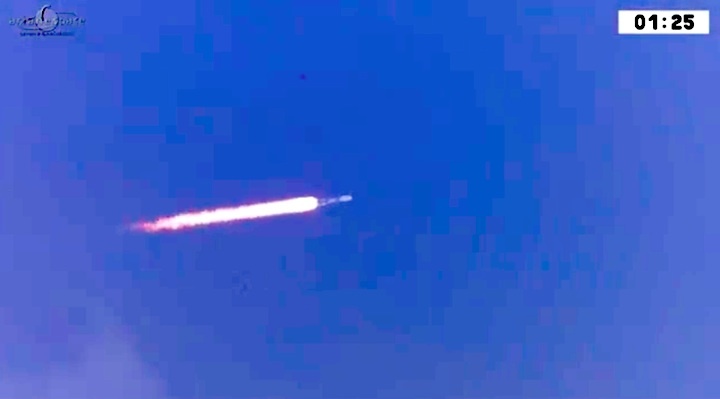
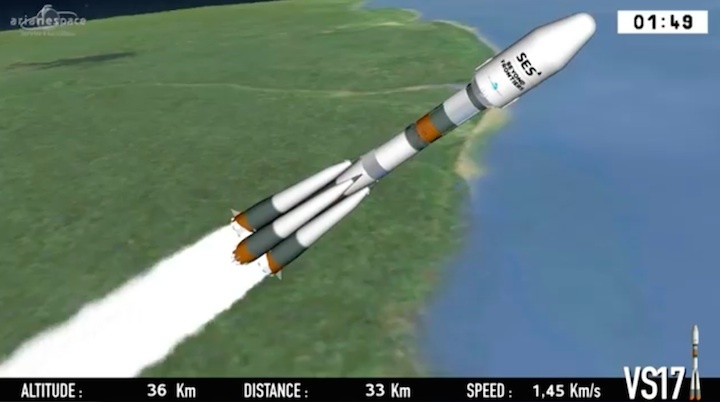
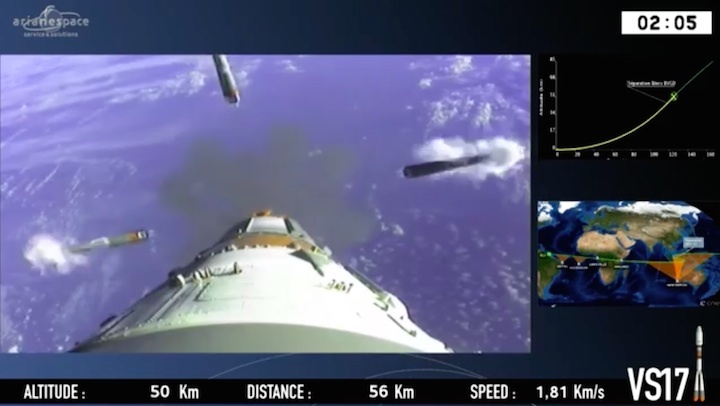
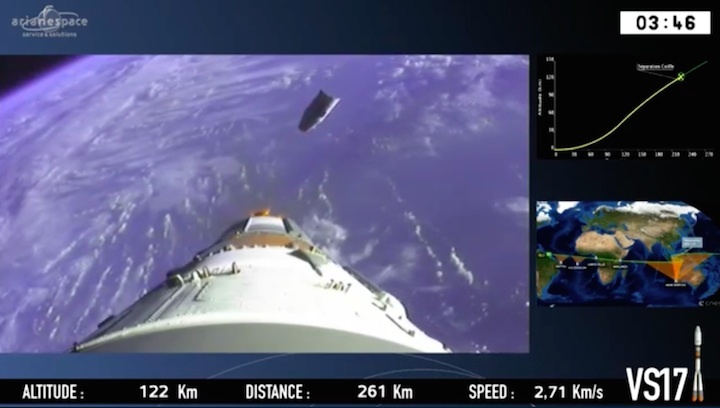
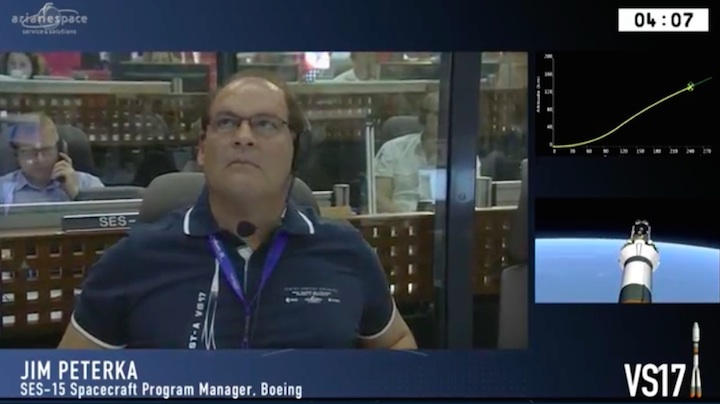
Quelle: arianespace



